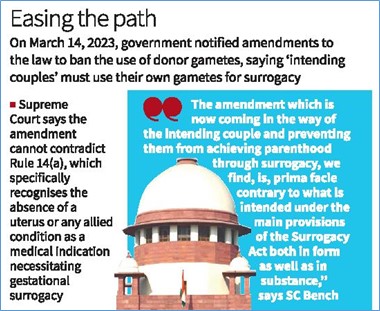PREVIOUS
Surrogacy (Regulation) Rules, 2023
October 31 , 2023
841 days
1340
0
- The Supreme Court has protected the right of parenthood of a woman, suffering from a rare medical condition, by staying the action of a law.
- Due to the complicated health condition, the petitioner women cannot produce her own eggs/oocytes.
- She suffers from a rare medical condition known as Mayer Rokitansky Kuster Hauser (MRKH) syndrome.
- However, a government notification on March 14 this year amended the law, banning the use of donor gametes.
- It said “intending couples” must use their own gametes for surrogacy.
- The petition was filed in the Supreme Court challenging the amendment as a violation of a woman’s right to parenthood.
- The 2023 amendment contradicted the Sections 2(r) and 4 of the Surrogacy Act, 2021.
- These sections recognised the situation when a medical condition would require a couple to opt for gestational surrogacy in order to become parents.
- The SC interpreted the law to mean that the child would be considered genetically related to the husband when Rule 14(a) applied, allowing the gestational surrogacy process to proceed.

Leave a Reply
Your Comment is awaiting moderation.


